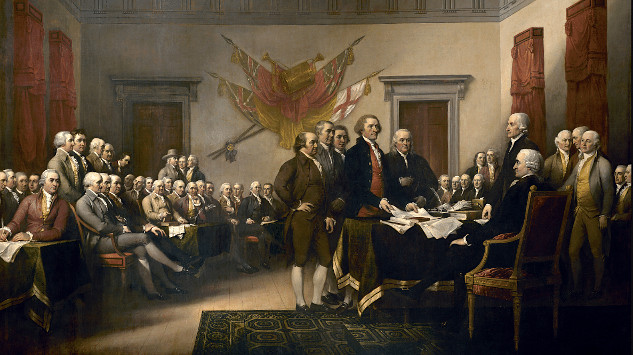
An abstract depiction of the United States, symbolizing the fragmentation and challenges to democracy amidst rising inequality and modern political corruption and tribute required.
In This Article:
- What is the history of tribute, and how does it relate to today?
- How does Mar-a-Lago exemplify a modern tribute system?
- Why is the Emoluments Clause critical to democracy?
- How has $50 trillion shifted from the middle class to the top 1%?
- What lessons can we learn to stop the cycle of tribute politics?
Mar-a-Lago: Where Billionaires Pay for Influence
by Robert Jennings, InnerSelf.com
Throughout history, the elite rulers have demanded tribute from those under their rule. It might have been in the form of gold, grain, or even labor. Still, the purpose was always to demonstrate submission, secure favor, and consolidate control. This practice wasn't just a feature of ancient empires; it was a cornerstone of many societies, from the Egyptian pharaohs to European kings.
For centuries, people fled these oppressive systems to seek freedom. North America, in particular, was a beacon of hope—a land that promised to replace oppressive tribute with fairness and opportunity. Yet today, modern forms of tribute have quietly crept back into our political landscape. The scenes playing out at Mar-a-Lago, where billionaires and corporate leaders line up to curry favor with Donald Trump, eerily echo the tribute systems of old.
Let's explore this evolution, from its roots in ancient history to the ideals that founded America and the troubling resurgence of tribute-like practices in our modern democracy.
The History of Tribute
The idea of tribute is as old as civilization itself. In ancient Mesopotamia, conquered city-states sent gold, livestock, or grain to their conquerors as a symbol of submission. In Egypt, the pharaohs used tribute to showcase their divine authority, demanding wealth and resources from subjugated peoples.

Ancient Romans presenting offerings to Caesar in a grand hall, symbolizing the power dynamics and tribute systems of the Roman Empire.
The Roman Empire perfected this system. As it expanded, it imposed tribute on its provinces. This wasn't just about economics; it was a reminder of who held the power. In China, the tribute system became an elaborate diplomatic tradition. Neighboring states brought gifts to the emperor in exchange for trade privileges and political recognition.
Tribute was only sometimes material. In feudal Europe, peasants paid with their labor and loyalty, providing crops or work to their lords. Religious institutions often demanded their share, collecting tithes that left little for the average family to survive.
Colonial powers carried on the tradition. The British extracted wealth from India, the Spanish plundered gold from Latin America, and the French siphoned African resources. The United States, as Marine Corps General Smedley Butler noted in his book War is a Racket, also extracted tribute, using military interventions in countries like Haiti and Nicaragua to protect corporate interests and ensure financial tribute flowed back to American businesses. Tribute was a tool for exploitation, a mechanism to keep wealth and power flowing upward.
A Rejection of Tribute by America
America's story begins with a rejection of tribute. The colonists bristled under British rule, where taxes—a more refined version of tribute—were levied without representation. "No taxation without representation" wasn't just a slogan; it was a declaration of independence from a system that demanded their wealth while ignoring their voices.
Early settlers also sought to escape the rigid hierarchies of Europe. Feudal systems left peasants tied to the land, paying their lords with crops and labor. Religious dissenters fled tithes and persecution, dreaming of a land where faith could be practiced freely. America was imagined as a place where merit, not money, would dictate success.
The Revolution cemented this vision. America's founders replaced the tribute model with a social contract. Taxes were no longer a tool of oppression but a mutual agreement—citizens contributed to the government in exchange for protection, infrastructure, and shared prosperity.

Depiction of the Second Continental Congress, where America’s founders rejected systems of tribute and established a government rooted in equality and representation.
The Return of Tribute in Modern America
Fast-forward to today, and it seems we've come full circle. While taxes remain a part of the social contract, new forms of tribute have emerged—less overt but no less corrosive.
The Supreme Court's 2010 Citizens United ruling opened the floodgates for money in politics. Corporations and billionaires now spend unlimited sums on campaigns, effectively "paying tribute" to ensure their interests are prioritized. Lobbyists wield similar power, offering donations in exchange for favorable policies.
Consider this: When a billionaire can write a check large enough to influence legislation, how is that different from the tribute systems of old? Instead of sending gold to a king, they funnel millions to super PACs and political campaigns.
The growing wealth inequality in America mirrors the hierarchies that once defined feudal societies. Just as serfs labored for the benefit of lords, modern workers often see their productivity siphoned upward, enriching CEOs and shareholders. Today, inequality in America rivals or exceeds that of the Gilded Age, a period notorious for its vast economic disparities and unchecked corporate monopolies.
Over the past few decades, an estimated $50 trillion has shifted from the middle class to the top 1%, a staggering redistribution of wealth that has left millions struggling while a small elite amasses unimaginable fortunes. This trend is not sustainable.
Like the Gilded Age, where inequality sparked labor unrest and demands for reform, today's economic disparity undermines the social fabric, erodes trust in institutions, and stifles the potential for upward mobility. The concentration of wealth and power has created a system where opportunities are increasingly limited for the many, further entrenching economic hierarchies that feel disturbingly familiar.
Mar-a-Lago: A Modern Court of Tribute
At the center of this troubling trend is Mar-a-Lago, Donald Trump's private club and frequent base of operations. During his presidency, it became more than just a retreat; it became a court where the wealthy and powerful paid homage to curry favor.

Mar-a-Lago, the modern court where wealth and influence converge, echoing the tribute systems of history in today’s political landscape
The U.S. Constitution's Emoluments Clause is clear: federal officials cannot receive payments or gifts from foreign governments without congressional approval. This clause protects public service integrity and ensures leaders prioritize the nation's interests over personal gain. When leaders ignore this safeguard, it opens the door to corruption and foreign influence, undermining the very foundation of democracy.
Trump openly flouted this rule. Foreign dignitaries and corporations spent lavishly at his properties, knowing it was a direct line to the president. By disregarding the Emoluments Clause, the government signals to citizens and foreign powers that private enrichment trumps public accountability, eroding trust and weakening the ethical guardrails of governance.
In medieval times, kings held court where nobles brought gifts to secure their favor. At Mar-a-Lago, the dynamics are strikingly similar. In the wake of the 2024 presidential election results, the wealthy lined up not with jewels or gold but with checks, event bookings, and memberships, hoping to gain Trump's ear. Numerous billionaires eagerly offered substantial gifts to the President-elect, including hefty contributions to inauguration funds and other lavish gestures.
These acts, often from individuals who previously faced public conflicts or adversarial relationships with Trump, signal a troubling trend of the ultra-wealthy aligning themselves with power to secure influence and favor. Membership at Mar-a-Lago has soared, with fees doubling after Trump's election. Corporate leaders hosted events there, effectively paying tribute to secure influence. Lobbyists booked rooms at his hotels, understanding that access often equaled results.
The Cost of Modern Tribute
This resurgence of tribute has profound consequences for democracy. When political leaders openly profit from their office, it undermines public trust. If billionaires can buy access while ordinary citizens struggle to be heard, faith in democracy falters.
Tribute diverts resources that could strengthen the commons—schools, healthcare, infrastructure—to serve private interests. The result is a society where the few prosper at the expense of the many.
Tribute systems ensure that power and wealth remain concentrated. The same dynamic exists today, as policies favoring the ultra-wealthy widen the gap between rich and poor.
Breaking the Cycle of Tribute
History offers lessons for breaking free from this cycle. America's founders envisioned a government accountable to its people. We must return to that ideal by enforcing laws like the Emoluments Clause and strengthening protections against corruption.
Change begins with civic engagement. Grassroots movements, public advocacy, and informed voting can challenge entrenched power and push for systemic reforms.
We must limit money's influence in politics to dismantle modern tribute systems. Overturning Citizens United and introducing stricter campaign finance laws would be a start.
The story of America is a story of striving—striving to escape the systems of tribute that defined the Old World and build a society rooted in fairness, opportunity, and freedom of religion. Yet today, the scenes at Mar-a-Lago remind us how easily those systems can creep back.
We stand at a crossroads. Will we accept a future where modernized and monetized tribute defines our political landscape? Or will we reclaim the ideals that made America a beacon of hope? The choice is ours, and the time to act is now.
Related:
About the Author
 Robert Jennings is the co-publisher of InnerSelf.com, a platform dedicated to empowering individuals and fostering a more connected, equitable world. A veteran of the U.S. Marine Corps and the U.S. Army, Robert draws on his diverse life experiences, from working in real estate and construction to building InnerSelf with his wife, Marie T. Russell, to bring a practical, grounded perspective to life’s challenges. Founded in 1996, InnerSelf.com shares insights to help people make informed, meaningful choices for themselves and the planet. More than 30 years later, InnerSelf continues to inspire clarity and empowerment.
Robert Jennings is the co-publisher of InnerSelf.com, a platform dedicated to empowering individuals and fostering a more connected, equitable world. A veteran of the U.S. Marine Corps and the U.S. Army, Robert draws on his diverse life experiences, from working in real estate and construction to building InnerSelf with his wife, Marie T. Russell, to bring a practical, grounded perspective to life’s challenges. Founded in 1996, InnerSelf.com shares insights to help people make informed, meaningful choices for themselves and the planet. More than 30 years later, InnerSelf continues to inspire clarity and empowerment.
Creative Commons 4.0
This article is licensed under a Creative Commons Attribution-Share Alike 4.0 License. Attribute the author Robert Jennings, InnerSelf.com. Link back to the article This article originally appeared on InnerSelf.com
Article Recap
Tribute systems, once limited to monarchs, have resurfaced in modern America. Mar-a-Lago symbolizes this shift, where billionaires exchange wealth for influence, exacerbating wealth inequality. This article dives into the historical roots of tribute, its rejection by America\u2019s founders, and its troubling resurgence today.

